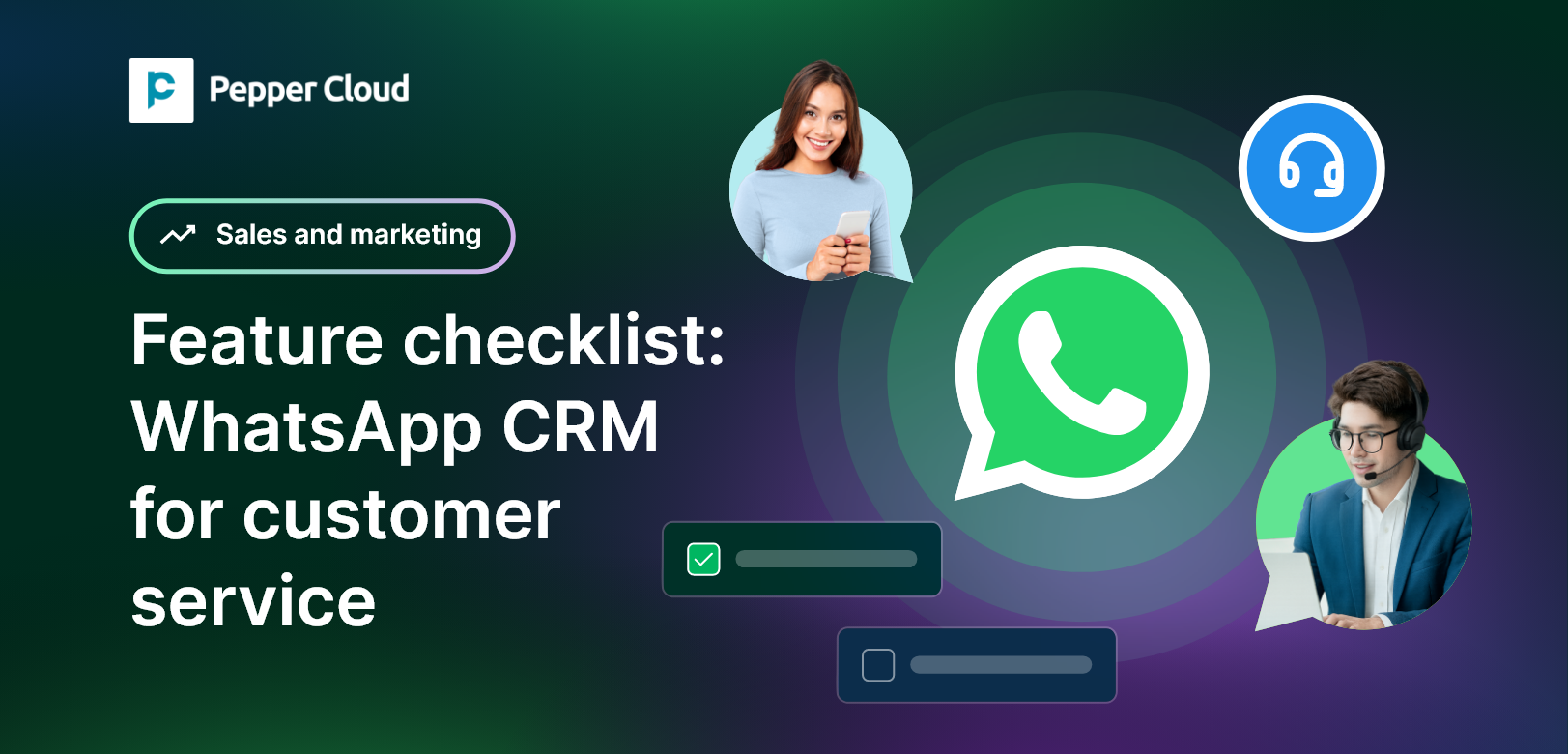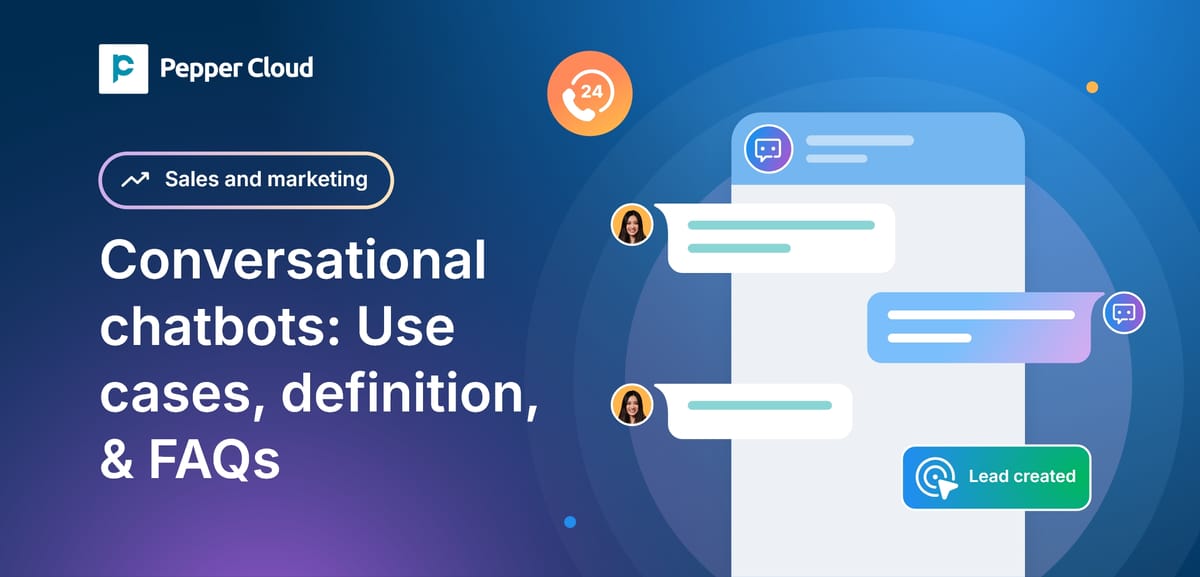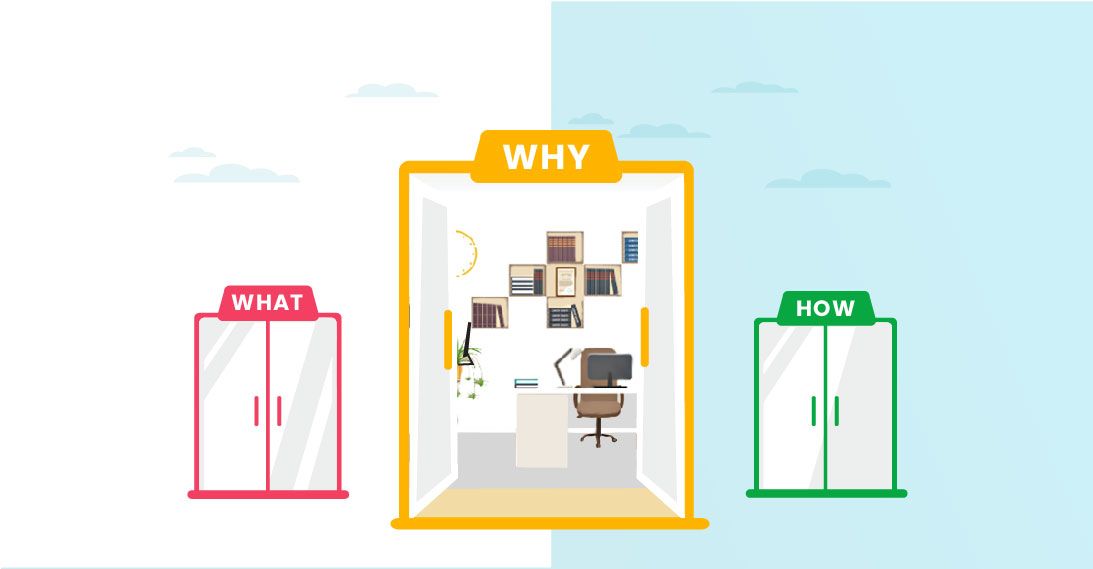Feature checklist: What to look for in a WhatsApp CRM for customer service
Discover the essential features of a WhatsApp CRM for customer service. Learn what to look for to improve support efficiency and customer satisfaction.

Picture this: a customer has just placed an urgent order with your business, but when they message you on WhatsApp with a query, the reply is delayed, inconsistent, or worse—missed entirely. That one poor interaction could mean a lost sale or a damaged reputation. This scenario plays out daily for businesses that rely on WhatsApp without a structured system in place.
The solution is clear: adopting a WhatsApp CRM for customer support. This tool ensures your team never loses track of chats and gives them one central hub to manage enquiries, track history, and respond faster. In this guide, you’ll explore a practical WhatsApp CRM features checklist designed to help you choose the right system—whether you’re running a neighbourhood café juggling customer bookings, scaling an e-commerce brand managing hundreds of daily queries, or a B2B company like a software provider or logistics firm coordinating client requests.
Why customer service on WhatsApp needs a CRM
WhatsApp is already popular for casual chats, but customer service demands structure. Without a CRM, your support team may struggle with:
- Conversations scattered across multiple devices – without a WhatsApp CRM for customer service, you risk losing important messages, creating confusion for both your team and your customers.
- Lack of customer history in one place – agents can’t see past conversations, making it difficult to personalise responses or resolve issues quickly.
- No clear ticket assignment or tracking – without a system, queries may be duplicated or forgotten, leading to slower resolution times.
- Poor visibility into team performance – managers can’t measure response speed or customer satisfaction without proper analytics.
- Compliance and security concerns – using personal WhatsApp accounts for business support exposes sensitive data and increases the risk of GDPR breaches.
A WhatsApp CRM solves these issues by centralising chats, allowing multiple agents to collaborate, and providing performance analytics. In fact, businesses using WhatsApp Business alone deliver 225% faster response, and integrating a CRM can boost that further.
Essential features in WhatsApp CRM for customer support
When comparing solutions, ensure the following must-have WhatsApp CRM functions are included:
1. Ticketing and workflow automation
An effective WhatsApp CRM should also support ticketing features that streamline support operations. These include:
- Auto-creating tickets when a new query comes in, ensuring no request is overlooked.
- Auto-assigning tickets to the right agent or department based on workload, skill, or query type.
- Auto-escalating tickets if they remain unresolved beyond a set timeframe, helping you meet SLAs.
- Auto-distributing tickets evenly across the team to balance workloads and avoid bottlenecks.
2. Centralised chat management
A shared inbox lets multiple agents access customer chats without logging into personal WhatsApp accounts. This prevents missed messages and ensures smooth collaboration. For example, if one agent is offline, another can pick up the conversation without the customer having to repeat themselves.
3. Automation and chatbots
Chatbots handle FAQs, send order updates, and provide instant replies outside business hours. This helps reduce response times and increases customer satisfaction. A well-configured chatbot can resolve simple questions in seconds, freeing human agents for more complex issues.

4. Customer profiles and history
A good CRM integrates WhatsApp chats with existing customer data, giving you a complete view of previous purchases, complaints, and interactions. This context means your team can personalise conversations—like knowing if a customer had a recent delivery problem before starting a new chat.
5. Multi-agent collaboration
Agents should be able to leave notes, tag teammates, or transfer chats seamlessly to improve service quality. For instance, a billing question can be transferred to the finance team with all prior context preserved.
6. Analytics and reporting
Metrics such as first response time, average handling time, and resolution rates are crucial to measure performance. With clear reporting dashboards, you can identify bottlenecks, track improvements over time, and make data-driven decisions.
7. Security and compliance
Ensure the WhatsApp CRM offers end-to-end encryption, GDPR compliance, and role-based access to protect customer data. This is especially important for businesses in regulated industries such as healthcare or finance, where sensitive information must be safeguarded.
These capabilities ensure smoother operations, faster resolutions, and better accountability across your customer support team.
8. Advanced WhatsApp CRM functions that save time and costs
Beyond the basics, advanced features can transform your support operations:
- AI-based response suggestions: Save time by suggesting replies based on previous conversations.
- Integration with payment gateways or order systems: Let customers place or track orders directly within WhatsApp.
- Workflow automation: Auto-assign tickets, send reminders, or escalate unresolved issues.
These functions not only improve efficiency but also reduce support costs by up to 25%.
How to choose the best WhatsApp CRM for your business
To find the best WhatsApp CRM for small businesses or enterprises, consider these factors:
- Team size – Do you need multi-agent access or just a simple solution? Larger teams will benefit from role-based access, chat routing, and collaboration tools.
- Support volume – Will you be handling hundreds of chats daily or just a few dozen? Higher volumes require automation, ticketing, and SLA management.
- Integration needs – Do you require links with e-commerce platforms, CRMs like HubSpot, ERPs, or payment gateways? Integration ensures a single source of truth for customer data.
- Budget – Balance pricing with features to avoid overpaying. Look for solutions that offer scalability so you can start small and upgrade as your needs grow.
- Ease of use and onboarding – A CRM should be intuitive enough for your support team to adopt quickly without steep training costs.
- Security and compliance – Especially critical for industries handling sensitive data. Ensure the solution is GDPR-compliant and provides data protection.
- Reporting and analytics depth – Beyond basic metrics, advanced analytics can help you forecast support needs, track customer satisfaction, and identify trends.

Pepper Cloud - The best WhatsApp CRM for customer support
While there are many tools in the market, Pepper Cloud stands out as one of the best WhatsApp CRM platforms for businesses of all sizes. It not only offers the essential features like ticketing automation, shared inbox, and reporting but also provides advanced capabilities such as:
- Multi-agent shared inbox – manage all WhatsApp conversations in a single dashboard where multiple agents can collaborate, assign, and resolve queries seamlessly.
- AI-powered chatbot and other features – use intelligent bots to handle FAQs, send instant replies, and route conversations automatically, ensuring round-the-clock availability.
- CRM integration – link WhatsApp chats directly with customer records to view purchase history, track interactions, and personalise support in real time.
- Ticketing and workflow automation – automatically create, assign, and escalate tickets to improve accountability and ensure SLAs are met.
- Analytics and reporting – track first response times, resolution rates, agent productivity, and customer satisfaction with detailed reports.
- Security and compliance – PDPA-compliant, encrypted communication with role-based access ensures data security and trust.
- Scalability – from small businesses to large enterprises, Pepper Cloud adapts to your growth with flexible integrations and features.
By choosing Pepper Cloud as your WhatsApp CRM for support, you ensure your team is equipped with the right tools to deliver faster responses, improved resolutions, and happier customers.
Frequently asked questions (FAQs) - WhatsApp support CRM
1. What features should a WhatsApp CRM have for customer service?
At minimum: centralised chat management, automation, customer history, reporting, and security.
2. How do I choose the best WhatsApp CRM for my business?
Evaluate team size, chat volume, integration needs, and budget. Always trial before purchase.
3. Should small businesses invest in advanced WhatsApp CRM features?
If you manage high volumes, yes. For very small teams, basic must-have features are usually sufficient.
4. Which WhatsApp CRM features help reduce support costs?
Automation, AI-driven suggestions, and reporting tools help save time and reduce staffing costs.
5. Is WhatsApp CRM useful for B2B businesses?
Absolutely. B2B firms can use WhatsApp CRM to manage client onboarding, coordinate projects, and provide real-time support to corporate clients.
6. Does a WhatsApp CRM support omnichannel communication?
Some CRMs combine WhatsApp with email and social channels, helping you manage all customer conversations from a single dashboard.
7. What role do chatbots play in a WhatsApp CRM?
They automate repetitive queries, qualify leads, and provide round-the-clock availability while freeing agents for complex issues.
8. How can WhatsApp CRM improve customer satisfaction scores?
By ensuring faster replies, personalised conversations using customer history, and consistent support, CRMs can significantly raise CSAT and NPS levels.
Customer service on WhatsApp has evolved beyond simple chat replies. To provide fast, reliable, and personalised support, you need a WhatsApp CRM for customer service that goes beyond basic messaging. From centralised inboxes to advanced AI-driven automation, the right CRM can improve customer satisfaction and reduce support costs.
Use this feature checklist to guide your decision-making. Whether you’re a small business looking for the best WhatsApp CRM for support or an enterprise needing advanced integrations, the right solution will empower your team and keep your customers happy.






